 W
WThe marketing term netbook identified small and inexpensive laptops that were sold from 2007 to around 2013; these were generally low-performance. While the name has fallen out of use, machines matching their description remain an important part of the market for laptops running Microsoft Windows. Similarly, most lower-end Chromebooks run on hardware which would have been described as "Netbooks" when the term was current, and inexpensive tablets when used with an external keyboard are functionally equivalent to netbooks.
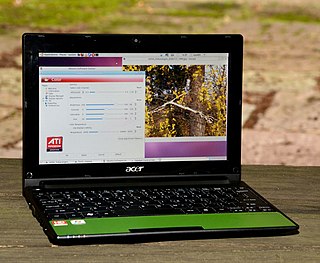 W
WAcer Aspire One is a line of netbooks first released in July 2008 by Acer Inc.
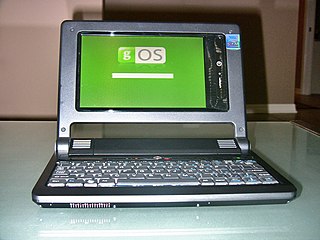 W
WThe CloudBook is a discontinued x86 subnotebook, or Ultra-Mobile PC developed by Everex using a VIA processor, chipset, and NanoBook reference design. It competed with the Asus Eee PC, the OLPC XO-1 and the Classmate PC. The device was categorized as a netbook when it was around 2008.
 W
WThe ECS G10IL is a netbook computer designed by ECS. Using an Intel Atom N270 processor, it includes a built-in tri-band HSDPA and HSUPA, the "Super 3G". The notebook is available with Linux or Windows XP.
 W
WThe Gdium is a subnotebook / netbook computer produced by EMTEC. The Gdium product is distinguished by its unique Loongson MIPS processor and the use of a USB key as a primary storage device. The Gdium netbook is marketed as an interface device to the Gdium "learning community"—a website that provides hardware support, MIPS builds of open-source software, Linux computing tips, and educational resources targeted towards teachers and students within the K-12 demographic.
 W
WThe first netbook offering by Gigabyte, the M912, is a hybrid netvertible Tablet PC device, was released in 2008. It features an Intel Atom processor and comes preloaded with either Windows XP, Windows Vista or a customised Linux distribution. The hardware varies slightly depending on the OS chosen. The Linux Version for example does not include Bluetooth and has a lower resolution screen. Press accounts suggest that there may be significant heat and speed issues compared with other netbooks. Other criticisms focus on Gigabyte's choice to ship one variant with Windows Vista Home Basic, which lacks official Tablet PC support.
 W
WThe HP 2133 Mini-Note PC was a full-function netbook aimed at the business and education markets. It was available with SUSE Linux Enterprise Desktop, Windows Vista or Windows XP. Its retail price started at US$499 for the Linux version with 4GB of flash memory. According to DigiTimes, the netbook was manufactured by Inventec. However, according to APC magazine, it was built by Compal Electronics who also make the MSI Wind and the Dell Inspiron Mini 9. The system was replaced in early 2009 by an upgraded model, the HP Mini 2140, which was also aimed at the education and business market.
 W
WHP Mini is a former line of small computers categorized as netbooks manufactured by Hewlett-Packard. They either contained a custom version of Ubuntu Linux, Microsoft Windows XP Home Edition or Windows 7 Starter operating system. Like most netbooks, they were not built with CD/DVD drives. However, HP did sell portable DVD-ROMs with HP's LightScribe disc imaging software. These netbooks are best used for written documents, small programs and web browsing. They can run standard software, but given their low price, they tend to have low end specifications, causing poor performance. They were announced from mid-2007, and marketed from 2008 through 2012.
 W
WThe IdeaPad S12 is a line of consumer-oriented netbook computers designed by Lenovo. It is a model in the IdeaPad series and their first netbook to have a 12" screen. The computers were put on the market in 2009 and currently come in black and white.
 W
WThe Mi Notebook Air is a portable computer introduced in 2016 by Xiaomi Corporation. There are two versions of the computer, which differ in screen size and some other hardware elements. The first 12.5-inch generation used an Intel Core M3-6Y30 microprocessor, which was later upgraded to an Intel Core m3-7Y30 microprocessor. Both models feature a Full-HD screen with a back-lit keyboard.
 W
WMoblin, short for 'mobile Linux', is a discontinued open source operating system and application stack for Mobile Internet Devices (MIDs), netbooks, nettops and embedded devices.
 W
WThe NanoBook is an ultra-mobile PC reference design by VIA Technologies, Inc. It has a clamshell form factor, a 7-inch 800×480 touchscreen display, and a full-size keyboard. It weighs less than 850 g and has a claimed battery life of up to 4.5 hours. It is based on the VIA VX700 chipset, featuring the VIA UniChrome Pro II IGP integrated graphics and powered by the 1.2-GHz VIA C7-M ultra low voltage processor. It includes up to 1 GB DDR2 memory, a minimum 30-GB hard drive, 802.11g WiFi, Bluetooth and Ethernet support, as well as a 4-in-1 card reader, a DVI port and two USB 2.0 ports.
 W
WThe Noahpad is a Netbook developed by the Taiwanese company E-Lead. This small laptop shares some similar characteristics with other Netbooks launched in 2007, like the ASUS Eee PC, the OLPC and the Classmate PC.
 W
WThe Nokia Booklet 3G was a netbook produced by the Finnish company Nokia. It was announced on 24 August 2009.
 W
WThe A110 is a netbook computer by One. It is built on a reference design by Quanta Computer and was announced to run Linpus Linux. However, some or all of the first batch have actually been delivered with a modified Ubuntu Linux installed, using SquashFS to fit the system in the 2GB Flash memory.
 W
WThe Palm Foleo was a planned subnotebook computer that was announced by mobile device manufacturer Palm Inc. on May 30, 2007, and canceled three months later. It intended to serve as a companion for smartphones including Palm's own Treo line. The device ran on the Linux operating system and featured 256 MB of flash memory and an immediate boot-up feature.
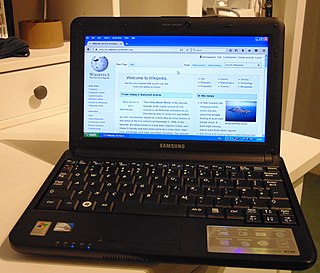 W
WThe Samsung N130 is a subnotebook/netbook computer designed by Samsung. At the time of its introduction, it was noted for a good keyboard, large 6-cell battery as standard, giving a battery life of up to 7.5 hours a medium 160gb SATA hard disk drive and a release price of 349 USD.
 W
WThe Samsung NC10 is a subnotebook/netbook computer designed by Samsung. At the time of its introduction (2008), it was noted for its combination of a 10.2" screen and large 6-cell battery as standard, giving a battery life of up to 7.5 hours, a large hard disk drive and a release price of 499 USD.
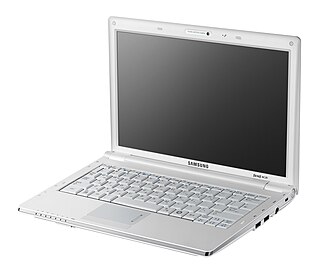 W
WThe Samsung NC20 is a subnotebook / Netbook computer designed by Samsung. At the time of its introduction,, it was the first mainstream netbook to use the VIA Nano processor and the first to support the x86-64 instruction set. The 12.1" screen size is larger than typical for this class of ultra portable PC. Its most direct competitors are the Lenovo IdeaPad S12 and the MSI Wind U210.
 W
WThe Skytone Alpha-400 is a Linux-based low-cost netbook with a 7 in 800×480 LCD screen, introduced in 2008. Its measurements (length×width×depth) are 210×140×32 mm and it weighs 0.65 kg.
 W
W W
WThe Sony Vaio P series is a range of ultraportable subnotebook computers launched in January 2009.
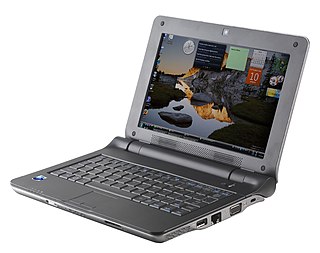 W
WVIA OpenBook is a laptop reference design from VIA Technologies, announced in 2008. The laptop case design was released as open source.
 W
WThe Zelybron Micro Nina is Zelybron's entrant to the Ultra-Mobile PC (UMPC) market and is aimed to provide a bridge between regular laptops and netbooks. The Micro Nina also is Zelybron's first OEM product.